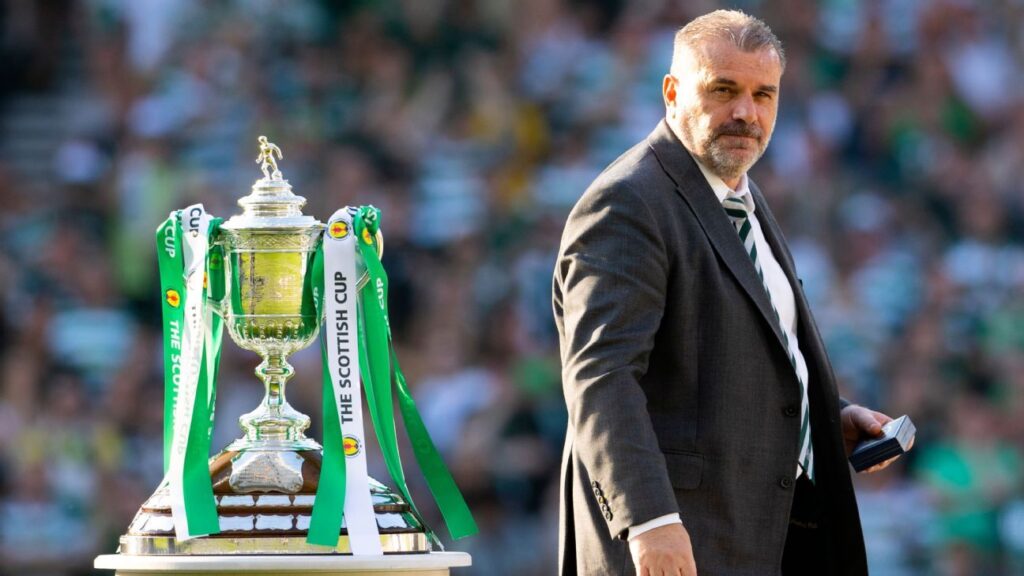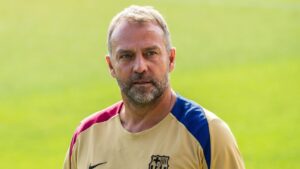During the build to Saturday’s Scottish Cup final, Celtic coach Ange Postecoglou was loath to discuss his future — or anything else that could distract him and his squad from the task at hand.
“Do you think the person who wins The Masters or Wimbledon thinks about all these other things? Or does he think about winning?” Postecoglou retorted, in typical fashion, when it floated that he could both focus on the final and think about his next career move
“I’m talking about elite sport here. Maybe you don’t understand or conceptualise that.”
Now though, with a 3-1 victory over Inverness in the bag — securing the Hoops their eighth treble and the fifth piece of silverware under Postecoglou — one wonders how long he will be able to close his ears to the increasingly cacophonous drumbeat surrounding his future.
– Stream on ESPN+: LaLiga, Bundesliga, more (U.S.)
Sources have told ESPN that Premier League heavyweights Tottenham Hotspur have made Postecoglou their preferred candidate for their vacant managerial role after being snubbed by Feyenoord boss Arne Slot. Rumours from earlier in the year had him linked with the likes of Chelsea, Leeds United and Leicester City, while reports from France have pegged the 57-year-old as a potential replacement for the outgoing boss Igor Tudor at Marseille — but it’s the Spurs job that keeps coming up.
Celtic are expected to make an improved contract offer to the Melburnian manager, who is currently on a 12-month rolling deal and would be able to leave the club without the need for any compensation but, if momentum is a genuine thing in these matters, it looks increasingly like Postecoglou will be taking his talents south of the border.
The response from both media and Tottenham supporters alike, inevitably, has been mixed, with perspectives largely coloured by one’s loyalties, nationality, knowledge of Postecoglou’s football, or Wikipedia browsing skills.
Having seen him rapidly revitalise the club and return them to the Scottish summit, Celtic fans are seemingly going through the stages of grief as their coach moves towards the exit, caught in various levels of denial, anger, bargaining, depression or acceptance as rumours over Postecoglou’s future swirl. Ironically enough, they are doing all this while vast swathes of the Spurs fanbase repeat almost the same conversations their Celtic counterparts did when the initial news broke that Postecoglou had been tapped as Neil Lennon’s replacement in 2021, just with a Premier League twist.
Postecoglou has never worked in England, in one of the big five leagues in Europe, or won outside the Scottish duopoly are the common themes, as is the complaint that, at 57, the Australian doesn’t represent the kind of “young” coach that could potentially overcome a perceived lack of experience on the big stage. Given the rate that the Premier League tends to spit managers up and spit them out, maybe they’re valid concerns.
What Postecoglou has done, though, is consistently succeed at almost every single club that has employed him; with silverware flowing into cabinets and an imprint left on the hearts and minds of supporters that have watched on. His Spurs candidacy isn’t built upon some kind of flash in the pan at Parkhead, but on over three decades of methodical and continued success at an increasingly higher legacy of competition. It’s telling that those sceptical reactions from Tottenham fans are a mirror image of those that occurred when Celtic came knocking; it feels like at every stop Postecoglou makes, he arrives with doubters, only for them to have become part of his choir by the time he moves to the next challenge.
“Challenge” of course is the operative word, because Postecoglou has rarely taken the easy route in his career. He won his first titles as a manager with his beloved South Melbourne at a time of mass upheaval in Australian soccer: the National Soccer League (NSL) was in the process of collapsing due to administrative incompetence and neglect. Upon finally receiving an opportunity to coach in the NSL’s successor competition — the A-League Men — he turned Brisbane Roar into one of the finest teams Australia has ever seen, guiding a side later dubbed “Roar-celona” to a record 36-game unbeaten run and two titles in a salary-capped competition that was designed to ensure that exact sort of dominance does not occur. A maiden Asian Cup was subsequently won as boss of the Socceroos before league titles were delivered first with Yokohama F Marinos in Japan and then Celtic in Scotland.
Not only is the trajectory clear, but it’s also difficult to see where exactly Postecoglou could have skipped a step or two to arrive at his current situation at a younger age. Further, there’s an obvious trend to be seen with this progression: though every step up the ladder brings more challenges, higher stakes, and bigger leagues, success has been a constant. And while his passport has inevitably thrown barriers into his path, this is simply something that has helped motivate his rise and sense of competitiveness.
If anything, Spurs fan’s adverse reaction to the news of his potential employment may provide an extra incentive for him to accept the job: there’s nothing in football that Postecoglou relishes more than proving the effectiveness of his ideals in the face of scepticism. At the same time, though, it’s that same spirit of defiance that could provide a glimmer of hope for Celtic fans. Those in his homeland that grew up watching, playing, reporting, and working with Postecoglou talk of how important the Champions League was for him and, with Spurs missing out on European football, how an opportunity to implement lessons learned from this season’s foray onto the continent with Celtic would appeal.
Admittedly, it’s far from a guarantee that he would succeed at Spurs. Since the departure of Mauricio Pochettino, this is a club that has chewed up and spat out two of the most highly credentialed coaches of all time in Jose Mourinho and Antonio Conte. That two coaches of such pedigree (sandwiched, as they were, between newly crowned Saudi league champion Nuno Espirito Santo) were unable to bring any kind of noticeable success to Tottenham Hotspur Stadium suggests that it’s not the absence of a glittering resume that would weigh down a potential Postecoglou era in North London.
And perhaps bolstering his appeal with a Spurs administration that is being treated with increasing disdain by its fanbase, while Mourinho and Conte seemingly couldn’t get out of London fast enough at the end of their tenure, Postecoglou would arrive acutely aware not just of the scale of the opportunity being afforded to him — coaching on the biggest league on the planet, for a club with the ninth biggest revenues in football, with world-class facilities, players, and resources — but also the importance of it. For just as much as he is a coach, Postecoglou is something of an apostle for football, someone who understands that the game and the clubs that play it are not just entities that sit above their communities but, instead, represent a part of them. That for many, their club is just as close, if not closer, than their own families.
As a newly arrived Greek migrant, whose family struggled with English, South Melbourne Hellas, as it was then known, provided a place of connection and community during his childhood and early adulthood, and to hear him speak about those times it’s almost impossible to think he hasn’t been drawn to similar environments ever since. As an outsider at Celtic, he never tried to pretend that he could properly understand the generational connection and love for the club that its fans had, but he treated it with reverence, endearing him even further to the Hoops faithful.
And family is important to Postecoglou. It needs to be remembered when predicting his future that he has children that he needs to worry about, children who have already had to study in two different countries and will need stability in future years. Indeed, any Spurs fan that wants a proper insight into the mindset of Postecoglou should read a tribute piece he penned five years ago to his late father Jim, who he describes as the “greatest man I know” and whose mantra “Κάτω η μπάλα” — which roughly translates to “Keep the ball down” — inspired his outlook on football far more than anything from “Barcelona or Liverpool or Pep Guardiola or Johan Cruyff.” It’s a piece that explains not just what drives him, but why any transition to the Premier League wouldn’t result in him moving away from his aggressive, high-pressing 4-3-3 outlook that emphasises dominating possession and constant forward movement.
Postecoglou might not have been Spurs’ first choice or maybe even their second. He is probably not their fans’ 1000th choice. He probably doesn’t care. But if he does land in London, he will do so with a long history of success that, despite the lack of name recognition, shows that he is a coach that has earned an opportunity to test himself on the global stage. And he’ll do it his way.




